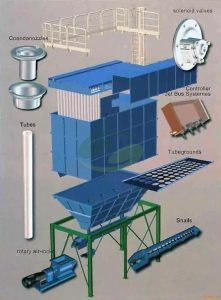
bag filter definition
Bag filters are widely utilized in gypsum industries to effectively remove dust from exhaust air, ensuring cleaner emissions and protecting equipment from dust buildup. These filters are mechanical systems designed to capture fine particles of dust that are generated during the manufacturing and handling processes. In gypsum production, dust can be released at various stages, including crushing, grinding, and calcining. Bag filters provide a reliable and efficient solution for maintaining air quality and complying with environmental regulations by trapping airborne particles.
How Bag Filters Work
In a bag filter system, a series of textile bags, typically made from specialized fabrics, are housed in a steel casing. The dust-laden air enters this housing, either by being blown in by powerful fans or extracted by exhaust fans. As the dust-filled air flows through the bags, the air is forced through the fine pores of the fabric, while the dust particles are trapped on the surface or within the fibers of the bags. The filtered, clean air is then exhausted out of the system, ensuring that the emissions released into the atmosphere contain minimal particulate matter.
Dust Collection Process
Once the dust is captured on the surface of the bags, it doesn’t remain there indefinitely. In order to keep the filter bags functional and prevent clogging, the accumulated dust is periodically removed. This is done through a process where air pulses are injected at regular intervals. These short bursts of compressed air reverse the airflow in the bags, dislodging the dust from the fabric and causing it to fall into a collection hopper below. From the hopper, the dust is gathered in dust containers for disposal or recycling. The pulse-jet cleaning method ensures that the filters remain efficient over extended periods of time and that dust is separated from the gas continuously.
Efficiency of Bag Filters
Bag filters are known for their high dust removal efficiency, often reaching up to 99%, depending on the type of dust being collected. This makes them a preferred choice in industries like gypsum manufacturing, where fine, powdery dust is prevalent. The ability of bag filters to capture even the smallest particles contributes to cleaner production environments and reduced environmental impact.
Temperature Limitations and Advances in Filter Materials
One of the key limitations in the use of bag filters has historically been their sensitivity to high temperatures. Gypsum processing, particularly calcining, often involves gases that exceed the thermal tolerance of traditional filter materials. However, advancements in fiber technology have greatly expanded the range of applications for bag filters. Modern filter bags are now made from heat-resistant materials that can withstand temperatures above 200°C, making them suitable for high-temperature environments found in gypsum and other industrial processes. These new textile fibers are not only heat-resistant but also durable, enhancing the lifespan and performance of the filters.
Factors Influencing Bag Filter Performance
Several factors affect the overall efficiency and longevity of bag filters:
1. Materials Used in Production: The fabric used in the production of filter bags plays a crucial role in determining the filter’s resistance to temperature, moisture, and chemical attack. Advanced synthetic fibers, such as polyimide or PTFE (Teflon), offer high resistance to harsh industrial conditions, including high heat and corrosive substances.
2. Dust Removal Zone: The design of the dust removal zone, including the size and shape of the hopper, affects how efficiently the dislodged dust is collected. A well-designed dust zone ensures that dust is properly funneled into containers without re-entering the airflow.
3. Structure and Form of the Bags: The configuration and shape of the bags—whether they are cylindrical, flat, or pleated—affect the surface area available for filtration. Larger surface areas generally result in better filtration efficiency, as more dust can be captured before the system needs to be cleaned.
4. Dust Wiping System: The method of cleaning the filter bags plays a critical role in their performance. Systems that use pulse-jet technology to inject compressed air at high speed ensure that dust is effectively removed from the bags without damaging the fabric. This not only maintains the filtration efficiency but also prolongs the lifespan of the bags.
Jet-Pulse Dust Removal Systems
One of the most popular and efficient types of bag filter systems is the **jet-pulse dust removal system**. In this system, short, high-pressure bursts of compressed air are periodically injected into the filter bags to dislodge the accumulated dust. The compressed air causes a sudden expansion of the filter bag, shaking off the dust and allowing it to fall into the hopper below. This method is highly effective because it cleans the filter bags without requiring the system to be shut down, ensuring continuous operation.
The jet-pulse system is particularly advantageous in industries like gypsum production, where dust is generated constantly. It minimizes downtime and ensures that the filters maintain their high dust removal efficiency throughout the production process.
Conclusion
Bag filters, with their high dust removal efficiency and adaptability to a wide range of industrial conditions, are indispensable in gypsum industries. The continuous advancements in filter materials, particularly in terms of heat resistance, have allowed bag filters to handle more demanding applications, including those involving high-temperature gases. With factors such as material selection, dust removal zone design, and efficient cleaning systems like jet-pulse technology, bag filters remain a key component in industrial air filtration, contributing to cleaner production processes and reducing environmental impact.







